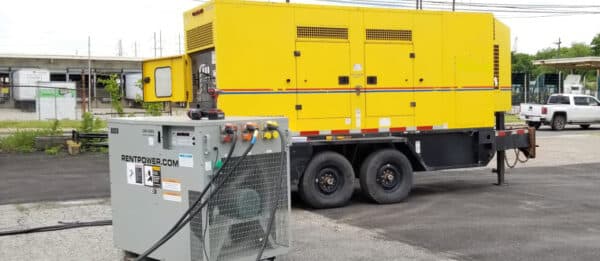What Is a Load Bank Test?
A load bank test uses a load bank to put an artificial load on a generator. The artificial load from the load bank brings the generator engine up to a specific operating temperature and internal pressure and load is gradually increased in set intervals at predetermined increments (called steps) to test whether the generator can handle the load increase and continue to perform properly over an extended period of time.
Basically, a load bank test exercises the generator to ensure that its ability to run at its full rated kW output.
When Should I Conduct a Load Bank Test?
While a generator should be load bank tested as part of routine service and maintenance, load bank testing is also commonly conducted on standby generators that have been sitting around idle for long durations. This is because many backup generators are generally not used unless there is a need, such as a power outage, which means the generator can sit around and go unused and can potentially cause problems for the generator down the line. This is especially true if the generator is not routinely inspected, serviced, and maintained for extended periods of time. Whether a generator is being used regularly or often sitting idly in standby mode, load bank testing on these types of units are often conducted to inspect and monitor the generator to ensure that it is running properly also known as exercising a generator, but it can also reveal any potential problems with the generator or items to look out for at a later time.
What If I Choose Not to Load Bank Test My Generator?
If your business or facility relies on a backup generator for any reason, then it is strongly recommended that you perform a load bank test on the generator regularly. This is especially true for generators that are mainly only used during times of peak potential outages such as hurricane season or Winter weather. This is also true for generator that are minimally tested by only using light loads or no loads (aka no-load testing). This is because the possibility of wet stacking can occur in diesel generators. Wet stacking occurs when unburned fuel accumulates in the engine’s exhaust and the cause of it is due to running the generator under light loads or no loads. When running your generator for short periods of time with light to no loads, the engine will be unable to reach its optimal operating temperature. If this is done repeatedly over a long period of time, unburned fuel or carbon deposits can accumulate, negatively impacting the generator engine, including loss of efficiency and can reduce the overall lifespan of the generator engine. When it comes to natural gas generators, load bank testing can help reveal potential service needs or requirements and can provide a clear indicator as to whether the generator is running and producing power as expected. Load banks are essential for generator testing to allow the generator to run at full capacity to reach its full output power and operating temperature.
In addition, resistive generator load bank testing provides other benefits, such as:
- Removal of carbon buildup and particulate matter that can impact the engine’s performance
- Minimizes the risk of the generator under-performing/unable to perform at full capacity
- Verifies the capacity of the UPS batteries and all related electrical connections
- Reduces the chances of wet stacking from occurring
- Alleviate stress on the engine that can lead to poor performance & possible mechanical failure
- Ensuring your generator will operate at full capacity when you need it most
Generator load bank testing should be included in your company’s generator preventative service & maintenance plan. Although it is a time consuming and intensive process, it is an absolute necessity to ensure that your generator will run and perform when you need it most.


